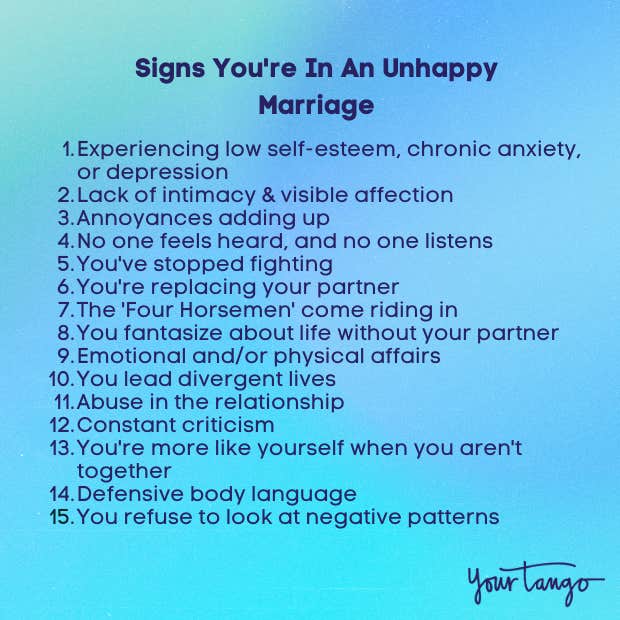15 Top Signs Of An Unhappy Marriage You Don't Want To Ignore
Recognize the signs of marital discontent.
 wavebreakmedia / Shutterstock
wavebreakmedia / Shutterstock Would you notice the signs of an unhappy marriage?
Many times, it's not really obvious that your marriage is on the rocks; after all, the problems that turn a good marriage into a bad build-up for years and years, so you may not even notice them right away.
If a confidential survey asked “Are you in a happy marriage?” would you have an immediate answer? What if it asked, “Are you in an unhappy marriage?” Would you be able to answer “yes” or “no” confidently, and explain your answers?
If you’re married and are given pause by this hypothetical, do you think you would know how to arrive at a confident answer? And do you think your spouse would have the same response to the questions?
Take a moment to consider your mindset when you and your spouse began dating, and then planning your wedding, honeymoon, and family. When you thought about your partner and your relationship, was there a subconscious backdrop of sunny skies, flowery fields, and sappy love songs?
And when you thought about yourself in the context of your relationship, did you feel energized, self-assured, or even invincible? Were you even aware of differences in values, personality traits, and communication styles? Did they matter or make you reconsider?
Or, were you utterly amazed that the universe had dropped at your doorstep the person who would complete your sentences (and maybe even you) for the rest of your life?
Fast-forward a stack of calendars into your marriage and ask the same questions. What’s your subconscious screensaver when you think about your marriage? Is it blue skies over a white sand beach, or are you caught in a downpour with no umbrella?
Knowing how to recognize the signs of what makes a good marriage or a bad one is the first step in the direction of marital happiness or saving your marriage.
Top 15 signs of an unhappy marriage in need of major change
1. One or both of you have low self-esteem, chronic anxiety, or depression
People in unhappy marriages are more prone to these negative emotional states and have a higher rate of illness. Marriage may not necessarily be the cause of these conditions, but the presence of low self-esteem, chronic anxiety, or depression can create dissatisfaction in a marriage.
Regardless of which comes first, the interplay between them is cause for concern and skillful handling if the goal is a satisfying and sustainable marriage.
2. There's a lack of intimacy and visible affection
Physical intimacy distinguishes romantic relationships from all others. If you are no longer being intimate, or if one of you feels rejected sexually, more profound issues are likely brewing under the surface.
A couple’s sexual relationship often mirrors the quality of a couple’s emotional connection and relationship satisfaction. Also, the lack of other signs of affection that connect happy couples often signals a level of disconnection.
3. The annoyances are adding up
Those little “oddities” that were once endearing (or at least tolerable) are now triggering emotional reactions like exasperation and disgust. Eating habits, personal appearance, housekeeping styles — everything gets noticed and runs through the filter of criticism.
When couples don’t deal with more significant and “real” issues, they rear their ugly heads in unexpected ways. Remember, it wasn’t the visible mass of ice that was the Titanic’s demise. It was the unforgiving monolith under the water’s surface.
4. No one feels heard, and no one listens
Listening is the most potent way to show love. When a partner listens, you feel valued and appreciated. Listening comes to some more easily than others. The good news: it is a skill that can be learned and improved with practice.
True listening requires a person to be fully present and free of distractions. It involves taking in not only the words, but the cadence, tone, facial expression, emotion, and body language. Listening in this way is a generous act that calls on a person to put him/herself aside for the moment and try to step into the shoes of the speaker.
When a person brings empathy and compassion to the table, the likelihood of successful communication is significantly enhanced.
Too often married people start to hear what they expect instead of the message conveyed. Or, they are silently rehearsing what they’ll say when it’s their turn to speak. When talking goes on automatic pilot, the lifeblood of the relationship has stopped flowing.
5. You’ve stopped fighting
The thought of fighting with a spouse often conjures a feeling of dread, especially for those who grew up in homes without good models of conflict resolution.
Contrary to popular belief, fights can lead to greater intimacy if the couple can talk through the problem in the fight’s aftermath and then repair the damage strategically. And that’s where communication skills like listening play a vital role.
Couples who don’t fight often withdraw, which leads to an emotional disconnection that can be more difficult to heal than the problems of couples that disagree often.
6. You’re replacing your partner
Instead of meeting your relationship challenges with your spouse, you turn to friends to distract, vent and avoid. Your partner, in turn, feels like you'd rather share your issues with your friends instead of working them out together.
Maybe you feel like your friends are better listeners, but your spouse will eventually check out emotionally altogether, stopping any progress in becoming closer.
7. The 'Four Horsemen' come riding in
These big relationship destroyers escalate the signs of untended issues, and, if left unaddressed, become the great predictors of divorce: criticism, defensiveness, contempt, and stonewalling.
Without addressing the Four Horsemen together, you run the risk of becoming trapped in a cycle of unhappiness.

8. One or both of you fantasize about life without your spouse
Imagining a happy life without your spouse is a form of psychological detachment. It essentially numbs you to your discontent and deprives the relationship of the emotional input necessary to fix the problem.
Such fantasy escape is an early step to “sliding out painlessly.”
9. There are emotional and/or physical affairs
Technology has complicated the definition of “affair,” as it blurs a lot of lines that would otherwise define personal motive and accountability. Thanks to cell phones, social media, and a myriad of dating apps, emotional affairs can happen right at the dinner table.
Sexual infidelity takes more effort, of course, but is usually the offshoot of emotional affairs. In many cases, both speak to unmet and uncommunicated needs within the marriage.
10. You lead divergent lives
You may have world views, values, dreams, and goals that conflict in significant ways. The life you imagined on your wedding day may no longer feel like it’s “happily ever after.” You no longer feel like a team rowing in the same direction.
It may dawn on you that you may want very different things, have strikingly different values and perspectives on important issues, and haven’t broached the subject of your differences.
If you aren’t talking about your thoughts, hopes, and dreams along the way and reconciling your differences to benefit the marriage, then your separate trajectories will likely turn into diverging paths that no longer intersect.
11. There's abuse in the relationship
Red flag. Red flag. Red flag!
A victim of abuse is often so demoralized and emotionally depleted that s/he is too busy surviving to attend to conceptual marital happiness. This is where the help of professionals who specialize in domestic violence is needed.
There is never just one reason, one culprit, for the erosion of happiness in a marriage. The danger in not being aware of potential offenders, however, is that you can convince yourself of the normalcy of mediocrity.
Marriage, in its optimal form, can be a safe place for us to grow and evolve. We all have past experiences and issues in need of healing. In a marriage based on friendship, nurturing, tenderness, empathy, and compassion, you have a better shot at becoming your best selves, flaws and all, together.
One of the key predictors that a couple will stay together is their ability to talk through their problems to a resolution that works for both people. Also key is understanding that there are times a couple can’t resolve conflict without the help of an objective professional to help them navigate the bumps.
12. There is constant criticism
Constant criticism is an indication that feelings of love and warmth for each other are being replaced by judgment. Constant criticism can also be a boundary violation, which is something couples should never do.
Of course, constructive criticism is fine in a relationship, as we all want to help our other halves be the best people they can be. But if the criticism isn't helpful and is just downright mean, keep it to yourself.
If you constantly criticize your partner, that's a clear sign that you aren't on the same page.
13. You feel more like yourself when you aren't together
You're supposed to feel like your spouse brings out the best in you and encourages you to fulfill your potential. You should like who you are when you're around them, and vice versa.
But if your marriage has become unhappy, you'll start to not like the person you are when your spouse is around. You may even actively avoid them so you can feel more like yourself.
And if you rarely spend time with each other, is it really a relationship?
14. Body language becomes more defensive than open
If you aren't quite sure if the marriage has turned sour, take a look at your body language as a couple. Is there less touching? Do you not sit as close together on the couch anymore?
If you both are not happy in the relationship, the body language may become more defensive and closed off when you are with each other.
You may not angle your bodies towards each other to show that you are welcoming each other. Or you may notice that your arms are usually crossed when you're around your spouse. It's defensive. It's closed off.
15. You refuse to look at negative patterns
After being in a long-term relationship with your spouse, it may be hard to acknowledge that you both are just not happy together anymore. Therefore, you may be inclined to let yourself be in denial about the whole thing.
Your mind won't let you identify negative patterns because they have put up the defensive sign of "Nope, everything's fine. We're happy here." But this actually hurts your marriage more. By not identifying what is wrong, you cannot come to a solution on how to fix it, causing more strife in your marriage.
If you can't recognize it, you can't improve it. This is a huge warning sign that you may be in a loveless marriage.
What to do about an unhappy marriage
Finding that your marriage is losing its value and passion? Take the time to reset and seek ways to repair what you both vowed to keep together. Give each other grace because change takes time — after all, how long did it take to arrive at this unhappy place?
Discuss finding a marriage therapist, and maybe even schedule individual therapy if the issues prove to be deeper. Communicate what you both need from the marriage, and how you would like to proceed.
There is hope, but you have to do the work to find it.
Dr. Jerry Duberstein, Ph.D., is a couples therapist and his partner, Mary Ellen Goggin, JD, is a relationship guide. In addition to marriage and couples counseling and coaching, they lead private intensive couples retreats. They are also the co-authors of Relationship Transformation: Have Your Cake and Eat It Too.

